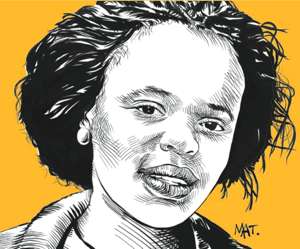Content Partner: Activate! Leadership for Public Innovation
I am a ticking time bomb – unemployable, uneducated and an ominous threat to you. I am part of the lost generation. You may as well write me off.
Just think how often you have read these words before or heard them around the dinner table. Did you react negatively to them then? Or was it easier to stick a disparaging label on a voiceless, faceless youth than it is to label me? Keep calling us a ticking time bomb and it will become a self-fulfilling prophesy.
Actually, I refuse to wear any of the above labels. I’m 23 years old, bubbly, energetic and I don’t give up. I’m part of a movement that celebrates the power of young people to face up to our challenges and to change this country. If you think I’m nice but naïve, hear my story and decide for yourself whether or not I’ve got a grip on reality.
I never knew my father. He left home before I was born and I spent most of my childhood wondering whether he was alive; and if he had stayed with us, would he have abused me like my stepfather did? My mother was a domestic worker, and when she eventually left my stepfather, she supported four children all alone. I never had a proper school uniform and when I got older, I walked for over 3 hours each day to attend the Qedilizwe Secondary School in Evaton township on the East Rand.
But by that time, I already knew that I was somebody; that I could achieve great things despite my circumstances. That moment of truth had come in my last year of primary education, when I was given an opportunity to attend a private school. There, I often felt out of place because of my poor clothes or the fact that I had to walk when everyone else came to school in fancy cars. So I decided to bunk school and stay home. On several occasions, my teachers came to my house and took me back to school. Their persistence made me realise that they really did believe in me. Because of them, I started working harder, always curious as to what people saw in me.
Not everybody appreciated my curiosity though, and as a teenager I was branded a problem child and felt pushed down. When I was 16 years old, I read a poem to the boisterous audience of a loveLife concert and quickly became part of that organisation. There, among young people who were all committed to living their dreams, I felt free at last. I chose to complete matric and to stay away from sex. My outgoing personality made me a natural for press interviews and I often spoke on radio. I began to see a bright future for myself. Unfortunately, there was a group of boys who thought that I was too smart for my own good. At least, that’s what they told me as they took turns raping me for the second time in four years. It’s not easy to forgive or forget. I feel like I have been robbed of some of my power and the freedom to be me.
I still live in fear of being attacked at any time in my own community, although the guys who did this to me are now in prison. The emotional journey is a tough one and the process of psychological healing is also very expensive. I have up-days and some very dark days. However, I am not giving up. That thought never crosses my mind. I am now a master facilitator at Activate! Leadership for Public Innovation, training hundreds of other young people just like me.
Our past lives may be different and we have our own specific issues and concerns. But as Activators we have a common message: that you should not give up on young people; that we can define a bright future for this country, despite our hectic past. Sceptics will say that you can’t overcome the deficits of childhood; that children who lose out early lose out for life. We also don’t dispute the fact that a well-educated person has an advantage over those of us who struggled through bad schooling. But we’ve got the latest cognitive science on our side: it shows that our brains have enormous capacity for change far beyond childhood.
In fact, from adolescence to the age of about 25 years, our minds are programmed to thrive on risk-taking and uncertainty that underpins an entrepreneurial, creative and diversifying economy. This is the time that we can become wired for innovation. If – for the best part of a decade beyond schooling – our brains are specifically primed for ingenuity, why do we write off young South Africans as the ‘lost generation’? We need a serious attitude change. Passionate and motivated young people can learn to overcome many of the shackles of dismal education and still contribute big-time to society.
The process of ‘rewiring’ a generation is no mean feat. It requires exposure to ideas as much as it needs skills training. Many rural young people – though leaders in their own communities – have not travelled more than 50 kilometres from home. Almost inevitably, their worldviews are small. But expose them to big ideas and connect them to others, and their worlds explode outwards. They crave more knowledge and opportunities for debate and reasoning. From each other, they learn to think. They can become innovators in their communities. They inspire everyone they meet.
For too long, we have waited on the State to solve all our problems, but it is clear that government is better at bricks and mortar than mending the fabric of society. For us, a constant refrain is to move away from an “if…then” attitude to a “now-how” mindset. We won’t wait for anyone to rescue us. We want to act now, and this is how we are going to do it:
Step one is to build an upbeat identity for young people – not as victims of the past but as trendsetters of the future. That means learning to trust each other, despite where we come from. For Activators, it means black and white sharing the same dormitory, and Young Communist League and Democratic Alliance Youth members moulding each other’s rhetoric. For a few of us, it will even mean rapist and rape survivor learning to trust one another. But if this new identity is to take hold across society, our voices will need to be heard clearer and louder. Too often, the voices of substance are drowned out by louder personalities or petty political events that pre-occupy the media. We must create the platforms for young people to communicate and contribute to critical thinking.
In this regard, new connections are vital. It is almost impossible for a young person without social connections to access finance or to meet a person of influence in the sector in which they work. If we are to create a culture of innovation, we have to open up our social systems and develop connections across race and class. Without these links we will miss out on the potential and productivity of far too many of our citizens.
Innovation is a popular buzzword, but it must also become an entrenched and sustained process across the public and private sectors. We know that young people can be the drivers: often times they already are. We are not naïve in our understanding of what it would take to develop this culture: there is a crisis in literacy and the capacity to write; our education system is not providing the solid foundation for intellectual development; and far too many receive no early childhood stimulation. We urgently need to tackle all these factors. But we also know that our townships and rural areas are filled with innovators: homemade wheelchairs and adapted bicycles are commonplace, young people run peer-to-peer tutoring programmes that reach thousands, and mobile technologies are opening up opportunities for high-tech but socially relevant solutions.
The stakes are high: we can either take risks on young people or continue to consign a generation to the dustbin of history. If we go with the first choice, we must accept that there is no such thing as the lost generation. Every young person we have met has plenty of potential; we simply need to find the mechanisms that unleash their passion and their minds. There is one certainty: given a chance and given support, many young South Africans would dedicate their lives to transforming this country. So, we have hope – we are a generation of hope. If history has taught us anything, it is that change is possible. Despite often being knocked down, we know how to get up again. This fact is true: you have to be in the game to have a chance of winning – and we are young people worth betting on.
***
Activate! Leadership for Public Innovation is a national network of young people committed to social transformation. United across race and class, they will develop the perspectives and skills of innovation needed to tackle some of South Africa’s most challenging social issues.
To find out more, contact Activate! on: info@activateleadership.co.za or www.activateleadership.co.za





